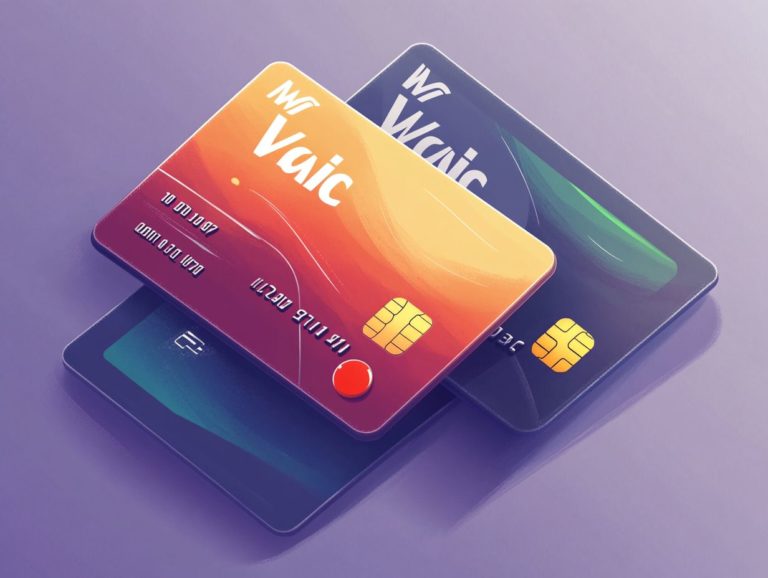What Are the Best Credit Cards for Students?
Navigating the world of finances as a student can be a daunting task, but student credit cards present a valuable opportunity for you to build credit while managing your expenses effectively.
This article explores the many benefits of student credit cards, from establishing a solid credit history to refining your financial management skills.
You ll explore key factors to weigh when selecting the right card, along with some of the best options available and tips for responsible usage.
Discover how to maximize your financial journey and set yourself up for success!
Contents
Key Takeaways:

- Building credit history and developing financial management skills are important benefits of having a student credit card.
- When choosing a student credit card, consider factors like interest rates, fees, rewards, credit limit, and credit score requirements.
- Responsible credit card use for students involves budgeting, payment strategies, and avoiding debt and overspending.
Unlocking the Power of Student Credit Cards!
Student credit cards are crafted specifically for you as an undergraduate or graduate student, giving you a unique chance to build your credit history while managing your finances with care.
These cards cater to individuals like yourself who might not have an extensive credit background, often requiring just a Social Security number and basic application details to get started.
These cards help you gain financial independence and establish responsible credit habits as you venture into the world of personal finance.
What truly sets these cards apart from traditional credit offerings are the benefits they provide, such as lower credit limits and rewards programs customized for your everyday expenses, like textbooks and dining out.
These features not only make them easy to use but also promote sensible spending habits.
Understanding how to manage your finances is crucial for your success! You ll learn to manage credit responsibly while gaining valuable insights into maintaining a positive credit score, which can greatly impact your future loan applications.
Eligibility is generally straightforward, and many issuers offer streamlined application processes to help you step into the world of credit with ease, laying a solid foundation for your future financial endeavors.
Benefits of Student Credit Cards
Student credit cards present a wealth of advantages for young adults, particularly in establishing a robust credit history. This foundation is essential for future financial goals, whether you’re looking to rent an apartment or secure a car loan.
By promoting responsible usage and effective budget management, these cards enable you to have a financial head start and the capacity to cultivate sound financial habits from the outset.
Being aware of the nuances of credit utilization rates which refer to the amount of credit you are using compared to your total credit limit and payment history is crucial, as these factors play a significant role in shaping your long-term credit score.
Building Credit History
Building your credit history with a student credit card is one of the most significant advantages you can access, helping you lay a solid financial foundation early in life. By making regular monthly payments and using your card responsibly, you can positively influence your credit score an essential factor for securing future loans and achieving financial stability.
Understanding how credit reporting bureaus evaluate credit history will enable you to recognize how your financial habits shape your credit profile.
To further enhance your score, it’s crucial to keep your credit utilization low, ideally below 30% of your available credit limit. This practice not only demonstrates responsible usage but also reduces the risk of accumulating debt.
In the long run, a robust credit history can unlock doors to lower interest rates on loans, better insurance premiums, and even advantageous housing opportunities.
Regularly monitoring your credit reports from various bureaus is a wise move; take advantage of free annual checks and consider using apps that provide updates. This way, you can spot any discrepancies early on.
These proactive measures will put you in the driver s seat of your financial future.
Start exploring your options today and take charge of your financial future!
Financial Management Skills
Student credit cards can be a remarkable tool for honing essential financial management skills, such as budgeting, tracking monthly payments, and understanding your spending habits. When you use these cards responsibly, you learn to manage your resources effectively. This skill is vital for achieving financial independence after graduation.
The experience you gain in understanding how much you can borrow and declaring your income honestly fosters better financial habits for your future endeavors. These experiences can profoundly influence how you approach your part-time jobs and any independent income streams.
By setting aside a portion of your earnings for savings and expenses, you cultivate a clear understanding of your financial priorities. Creating a monthly budget that aligns with your income can significantly reduce the risks of overspending.
Utilizing apps or spreadsheets to keep tabs on your expenditures ensures you remain accountable to your financial goals. Ultimately, combining responsible credit card use with effective budgeting strategies places you on a promising path to financial literacy, equipping you to tackle future challenges with confidence.
Factors to Consider When Choosing a Student Credit Card

When selecting a student credit card, it’s crucial to weigh several key factors, including interest rates, fees, credit limits, and the specific credit score requirements. Gaining a clear understanding of the application process and comparing the features of different credit cards can greatly enhance your chances of approval and overall satisfaction with the financial product you choose.
Evaluate these elements carefully to identify the best student cards that align with your financial goals and lifestyle, enabling you to make informed and confident decisions.
Interest Rates and Fees
Understanding interest rates and credit card fees is essential when evaluating potential student credit cards, as these factors can significantly impact your overall financial health. Cards with low or no annual fees, paired with competitive interest rates, are often the best choices for maximizing value while keeping costs in check.
This knowledge enables you to make informed decisions about the financial products you engage with. Make sure to compare offers closely, seeking cards that not only feature low introductory rates but also provide transparency on potential fees, such as late payment penalties and foreign transaction charges.
To uncover options that align with your budget, explore online comparison tools and read customer reviews. This ensures you fully grasp what you might owe over time. Building a good credit history begins with using a card wisely making on-time payments and keeping balances low to sidestep high interest rates that can swiftly undermine your financial stability.
Rewards and Perks
Student credit cards are bursting with exciting rewards that can seriously boost your benefits! Many come packed with enticing rewards features, offering cashback rates, points, or other perks that can enhance the value of the card.
For example, you might find cards that offer 1.5% cashback on all your purchases, or even higher rates in specific categories like dining, grocery shopping, or online entertainment. By choosing a card that fits your lifestyle, you can truly make the most of these rewards.
Keep an eye out for sign-up bonuses that could grant you extra points after spending a certain amount within the first few months. To maximize your earnings, consider these strategies:
- Plan your purchases to align with reward opportunities.
- Make timely payments to avoid any pesky interest charges.
- Take full advantage of additional promotional offers or referral bonuses.
By managing your credit card usage wisely, you can not only earn substantial rewards but also build a positive credit history that will serve you well in the future.
Credit Limit and Credit Score Requirements
Credit limits and credit score requirements are important factors in determining your approval odds when applying for a student credit card. Typically, issuers seek a minimum income, evidence of responsible credit use, and your ability to manage monthly payments effectively. Understanding these criteria will help you select the financial products that align with your needs.
As you embark on your credit journey, it s crucial to recognize that most card issuers have specific standards. A solid credit score typically in the good to excellent range can significantly enhance your chances of securing higher limits.
To boost your scores, consider:
- Make payments on time.
- Minimize outstanding debt.
- Avoid new credit checks. (These are hard inquiries that can affect your score.)
Becoming an authorized user on a responsible individual s account can positively influence your credit history. Simple practices like budgeting and making timely bill payments can lay a strong foundation for your financial future.
Top Student Credit Cards
When you re on the hunt for the best student cards, several standout options await, each designed with your financial needs in mind.
Consider the Discover it Student Cash Back, which offers impressive cashback rewards that can add up. The Capital One SavorOne is another excellent choice, known for its great benefits that enhance your spending experience.
The Bank of America and Chase Freedom Rise cards are tailored for those starting their credit journey. These cards not only help you build credit but also reward you with valuable benefits along the way.
Card 1: Features and Benefits

The Discover it Student Cash Back card is an excellent choice for students like you, offering remarkable cashback rates across various categories, including dining and groceries. What sets this card apart is its unique rewards feature that matches all cashback earned in your first year, presenting an outstanding opportunity to maximize your earnings while building your credit history.
Plus, with no annual fee, it s a financially savvy option for those mindful of their budgets.
You ll earn 5% cashback on rotating categories each quarter, allowing you to capitalize on your seasonal spending habits. This flexibility boosts your potential rewards and encourages responsible spending.
Compared to other student credit cards, the Discover it card truly shines with its enticing cashback match and user-friendly online portal for tracking your rewards. Additionally, it offers tools to monitor your credit score, enabling you to make informed financial decisions as you establish a solid credit foundation.
Card 2: Features and Benefits
The Capital One SavorOne card is crafted to offer students enticing cashback options, particularly for dining and entertainment. With its appealing rewards structure, zero annual fees, and a competitive introductory offer, this card emerges as a prime choice for those looking to strike a balance between rewards and practicality.
It s a superb financial tool for students eager to get the most out of their spending. Beyond its focus on food and fun, this card shines with unlimited 1.5% cashback on all other purchases, ensuring that you earn rewards no matter where your shopping adventures take you.
Whether you re sipping coffee with friends or stocking up on textbooks, the flexible rewards system is designed to fit the varied spending habits of students. In a landscape where many student cards impose restrictive earning rates or limit categories, the SavorOne distinguishes itself by providing substantial rewards on everyday expenses and a hassle-free application process.
You ll love this card, as it makes it not only appealing to cashback enthusiasts but also an ideal foundation for cultivating strong financial habits.
Card 3: Features and Benefits
The Bank of America and Chase Freedom Rise cards are two of the finest choices for students. Each card offers distinct benefits and features tailored to meet your financial needs. The Bank of America student credit card provides solid cashback options, while the Chase Freedom Rise card excels with rewards in specific rotating categories. Both cards come with no annual fees and are designed to help you build credit.
You can easily leverage the straightforward cashback structure of the Bank of America card, earning 1% on all purchases and up to 3% on select categories. This allows you to maximize your everyday spending effortlessly. Meanwhile, the Chase Freedom Rise card distinguishes itself with its rotating bonus categories, enabling you to earn 5% cashback on specific purchases. This presents an excellent opportunity for those willing to stay on top of the promotional cycles.
When you compare these options to other student credit cards, like those from Discover or Capital One, it s clear that both of these cards offer valuable incentives. They enable you to establish credit responsibly while earning rewards that align with your shopping habits.
Tips for Responsible Credit Card Use for Students
Mastering your credit card use will set you up for financial success! Practicing responsible credit card use is essential as a student who aims to build a strong credit history while avoiding the pitfalls of credit misuse.
By adopting effective budget management strategies and making timely monthly payments, you can foster positive financial habits that benefit you in the long run. Understanding the importance of avoiding debt and overspending will help you fully capitalize on the advantages your student credit cards offer.
Budgeting and Payment Strategies
Effective budgeting and payment strategies are crucial for students using credit cards. Crafting a budget that includes your monthly payments and essential expenses will help you avoid overspending and comfortably meet your obligations.
This proactive approach not only aids in managing your independent income but also supports your long-term credit aspirations. To enhance your budgeting efforts, consider tracking your daily expenses to identify spending patterns. Utilizing apps or spreadsheets can streamline this process, making it easier to categorize your expenditures.
Establishing a monthly payment schedule that prioritizes fixed costs, like rent and utilities, ensures your financial commitments are met on time. This way, you can sidestep late fees and protect your credit score.
Sticking to this plan instills discipline and enables you to make informed financial decisions, paving the way for a secure financial future.
Avoiding Debt and Overspending

Avoiding debt and overspending is essential for students using credit cards. These pitfalls can lead to long-term financial challenges. By understanding the importance of maintaining a healthy credit utilization ratio the amount of credit you use compared to your total credit limit you can build a positive credit history while keeping financial stress at bay.
To achieve this, establish clear spending limits. Start by crafting a comprehensive budget that reflects both your income and necessary expenses. This allows you to pinpoint discretionary spending areas where you can cut back. Regularly reviewing your financial situation is vital to staying aware of any changes that might impact your budget.
By keeping your credit utilization ratio low ideally under 30% you enhance your credit score and boost your chances of being approved for loans in the future. Practicing mindful spending and prioritizing needs over wants will help you safeguard against debt.
Watch this video for more insights on managing your student credit card effectively.
Frequently Asked Questions
Got questions about student credit cards? Here are a few common inquiries:
- What are the benefits of having a student credit card?
- How can I build credit as a student?
- What should I do if I miss a payment?
Take charge of your financial future today and start mastering your credit card use!
What Are the Best Credit Cards for Students?
The best credit cards for students offer low fees and interest rates. They also provide rewards tailored to student needs.
What Should I Look for in a Student Credit Card?
Choose a student credit card with low fees and interest rates. Look for rewards that match your spending habits.
Can I Qualify for a Credit Card as a Student?
Yes! Many companies offer student credit cards designed for your financial situation. These cards usually have lower requirements for credit scores and income.
Are There Student Credit Cards With No Annual Fees?
Absolutely! Several student credit cards come with no annual fees. Be sure to compare options and read the fine print to find the best fit.
Do Student Credit Cards Come With Rewards?
Many student credit cards provide rewards like cashback and discounts on student essentials. Find a card that rewards your typical spending.
Can a Student Credit Card Help Me Build Credit?
Yes! Using a student credit card wisely and making timely payments helps establish a positive credit history. This is crucial for future financial needs like loans or rentals.






